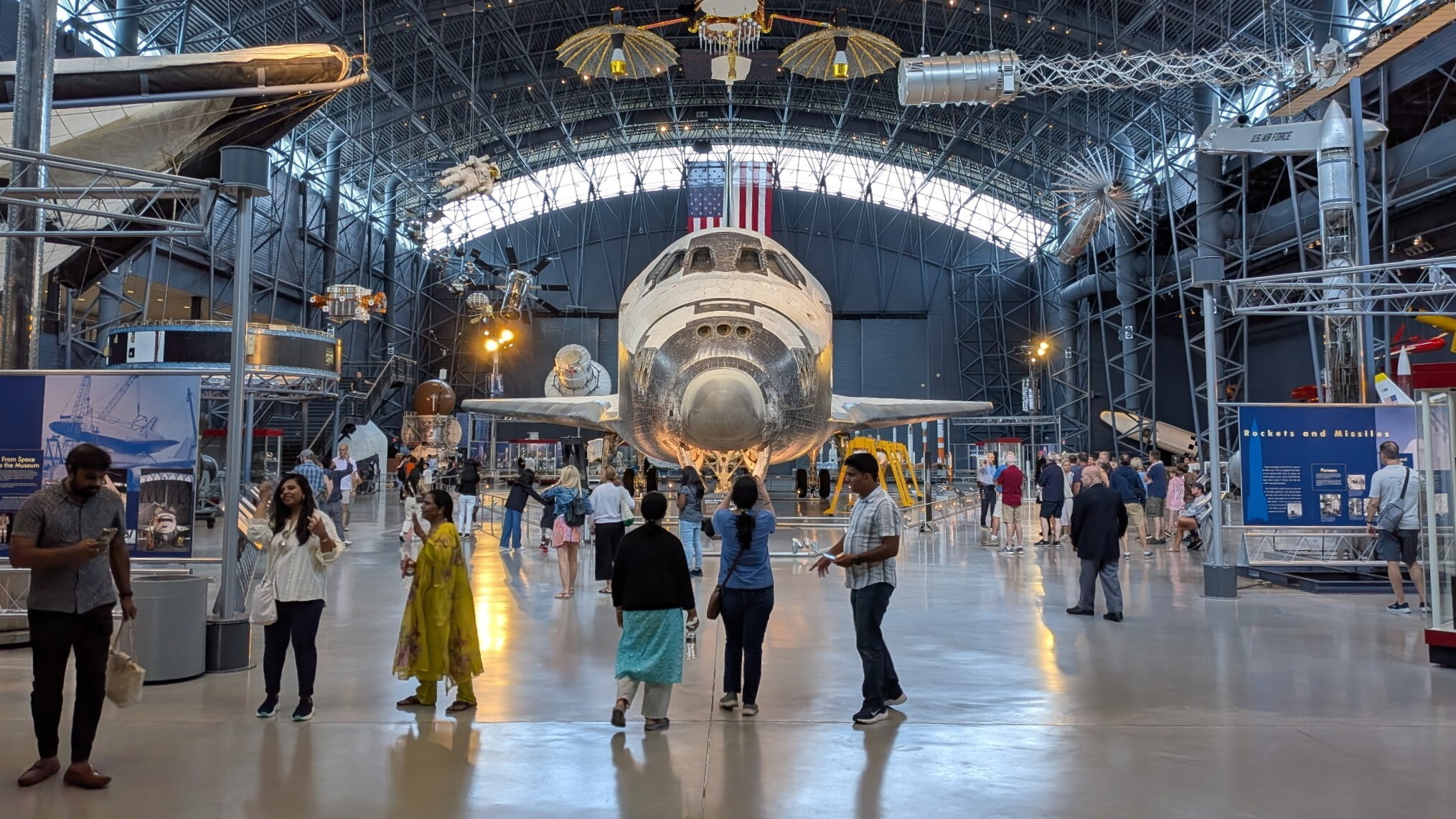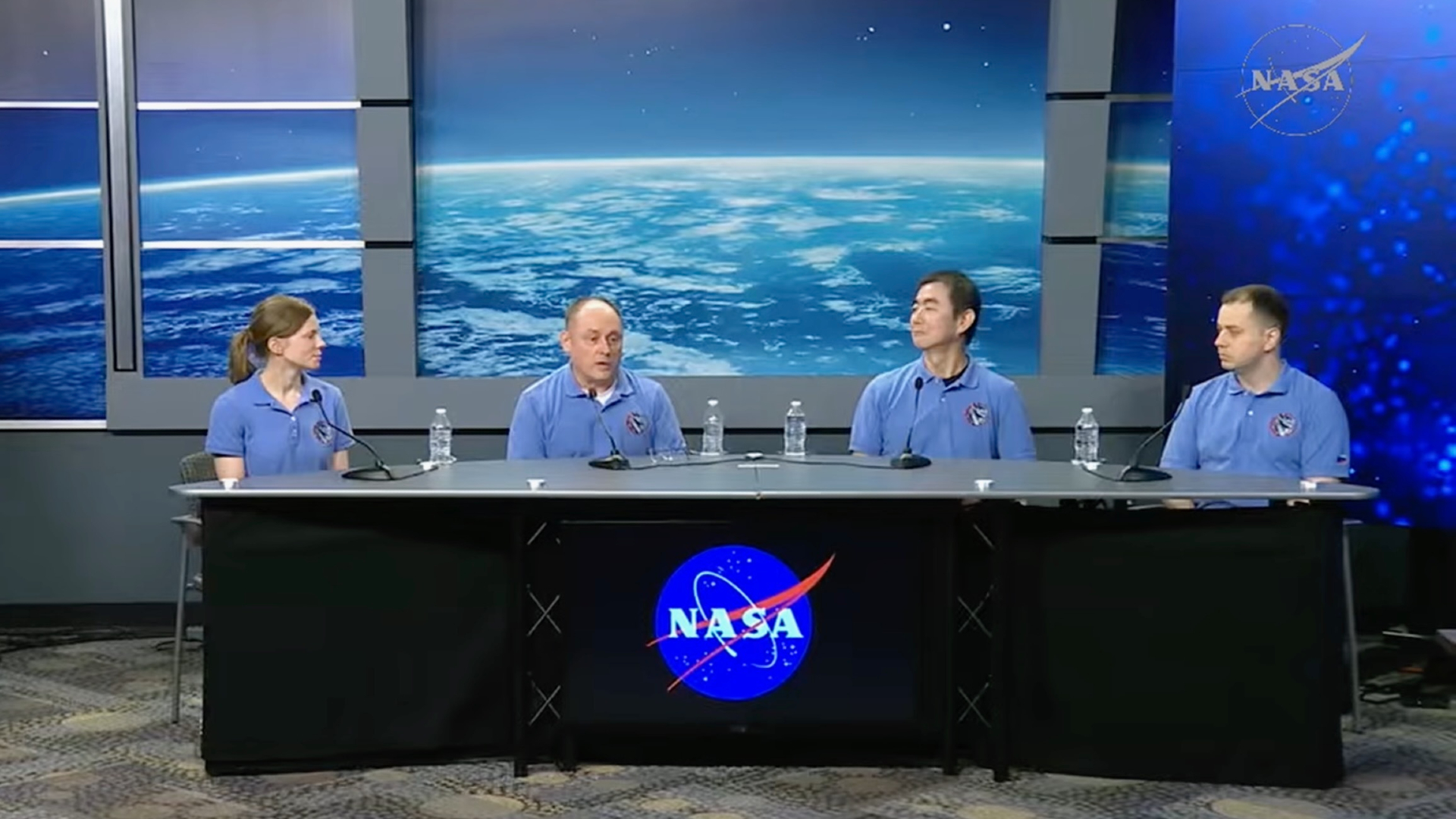Space shuttle Discovery fight continues as Texas senators rope Department of Justice into their tug-of-war with Smithsonian
Things seem to be escalating quickly…

A new front has opened in the battle over space shuttle Discovery, and the fight has made its way to the Justice Department.
The two Texas Senators trying to mandate the relocation of Discovery from the Smithsonian Institution's Udvar-Hazy Center in Virginia to Texas, John Cornyn and Ted Cruz, and joined by Texas Representative Randy Weber, are urging the Department of Justice (DOJ) to investigate the Smithsonian for violations of the Anti Lobbying Act.
In a letter sent to Attorney General Pam Bondi and Assistant Attorney General Brett Shumate on Oct. 22, the lawmakers allege the Smithsonian has improperly used federal funds to oppose President Trump's "One Big Beautiful Bill Act," (OBBBA) which orders the transfer of Discovery to Houston, the home of NASA's Johnson Space Center. They accuse the Smithsonian of lobbying Senate and House committee staff, coordinating with journalists to generate coverage in favor of keeping the shuttle within the Smithsonian's collection and circulating inflated estimates of relocation costs.
The dispute traces back to the "Bring the Space Shuttle Home Act," introduced by the Senators in April. It failed in committee, but was later included as part of Trump's "big beautiful bill". New language didn't specify Discovery, exactly, but instead directs the transfer of a human-flown "space vehicle" to a NASA center "involved in the administration of the Commercial Crew Program." When the bill was signed on July 4, it set a deadline for the NASA administrator to select a vehicle, and laid out an 18-month window for the vehicle's relocation to Houston.
In their letter, lawmakers describe Houston as "the cornerstone of America’s human space exploration program," and say the city is "honored" to welcome Discovery. However, the Smithsonian asserts it owns the space shuttle outright, and has raised serious concerns about the legalities of removing an artifact from the stewardship of the museum's national collection, not to mention the logistics and costs of physically moving the 122-foot-long (37-meter) orbiter across the country.
In a letter to Congress earlier this month, the Smithsonian said both it and NASA have determined that Discovery's relocation would require partial disassembly of the vehicle and that the minimum cost to do so could range from $120 million to $150 million — far higher than the $85 million allocated (but not yet appropriated) in the OBBA. That estimate also doesn't include the cost of constructing a new facility in Houston to serve as the space shuttle's new home.

The Smithsonian was chosen as Discovery's final home more than 10 years ago. In a nationwide competition to determine where the remaining space shuttles would reside after the retirement of the fleet in 2011, educational institutions, museums, science facilities and space center complexes all submitted bids for consideration, including the Smithsonian and Johnson Space Center.
Breaking space news, the latest updates on rocket launches, skywatching events and more!
In the end, Atlantis was given to the Kennedy Space Visitors Center, in Florida, Endeavour to the California Science Center and Discovery to the Smithsonian. According to the Institution, NASA handed over "all rights, title, interest and ownership" of Discovery to the museum in 2012. With that paperwork in hand, the Smithsonian has stressed that it has the legal responsibility for the conservation and long-term stewardship over the shuttle.
Texas lawmakers rejected both the Smithsonian's cost estimates of transporting Discovery and the museum's legal claim of ownership. Their letter to the DOJ cites "industry experts" that estimate the true cost to be more than 10 times less than the Smithsonian's projections, and disputes the position that the Institution is not a government entity.
Historically, the Smithsonian is recognized as a "trust instrumentality," an entity created by Congress to serve a public purpose, but one that operates outside the traditional structure of federal agencies. The Institution receives two-thirds of its funding from the government, but operates independently in the care of its national collection, which is held in trust for the American public to protect its artifacts as a permanent, publicly owned legacy.
In their letter, Cornyn, Cruz and Weber ask the DOJ to determine whether Smithsonian personnel or funds were spent as a part of Institution efforts to obstruct implementation of the law.
"These activities raise significant concerns under the Anti-Lobbying Act, which prohibits the use of appropriated funds for communications intended to influence members of the public to pressure Congress regarding legislation or appropriations matters. The Act also places limits on direct or indirect lobbying efforts funded by federal appropriations," the letter reads.
The lawmakers also expand their complaint to criticize Smithsonian leadership and the museum's exhibits for being part of "a politicized agenda that undermines its responsibilities as a federal government entity," over the Institution's depictions of slavery in American history and its inclusion of transgender women in the upcoming American Women's History Museum.
"This is a silly attempt to silence the Smithsonian from publicly defending their full and permanent 'right, title and interest' of Discovery," Joe Stief, founder of KeeptheShuttle.org, an independent group opposing the relocation, told Space.com in an Oct. 22 email.
The Smithsonian is governed by a Board of Regents. The board's chancellor is the Chief Justice of the Supreme Court, who presides over the Vice President of the United States, three members of the U.S. House of Representatives and three from the Senate, as well as nine citizen regents.
Stief said the lawmakers' complaint mirrors an earlier appeal to Chancellor and Chief Justice John Roberts in August, which drew no public response. "While the Chancellor did not publicly take any actions after the August statement, it appears that Sen. Cornyn is hoping to find a more receptive audience at the Department of Justice," Stief said.
The lawmakers' own letter to the DOJ itself cites multiple court decisions recognizing the Smithsonian as a federal government entity — “a government institution through and through” — which is, "subject to federal law and entitled to government immunities." With that distinction in mind, though, the Smithsonian's communications with Congress might not be considered lobbying, as the lawmakers' letter accuses.
According to guidance from the DOJ and the Government Accountability Office on the Anti-Lobbying Act, direct communications between federal entities and Congress about official business are treated as intragovernmental coordination, not lobbying, since the law targets public-pressure campaigns, not agency correspondence.
Still, whether a formal DOJ review in this instance would support the Texas lawmakers' views is unknown. Such a review could test the authority of the Anti-Lobbying Act over hybrid Institutions, like the Smithsonian, that rely on a combination of federal and trust funding. The Smithsonian has not commented on the lawmakers’ letter, and is unable to respond during the government shutdown.

Josh Dinner is the Staff Writer for Spaceflight at Space.com. He is a writer and photographer with a passion for science and space exploration, and has been working the space beat since 2016. Josh has covered the evolution of NASA's commercial spaceflight partnerships and crewed missions from the Space Coast, as well as NASA science missions and more. He also enjoys building 1:144-scale model rockets and human-flown spacecraft. Find some of Josh's launch photography on Instagram and his website, and follow him on X, where he mostly posts in haiku.
You must confirm your public display name before commenting
Please logout and then login again, you will then be prompted to enter your display name.
